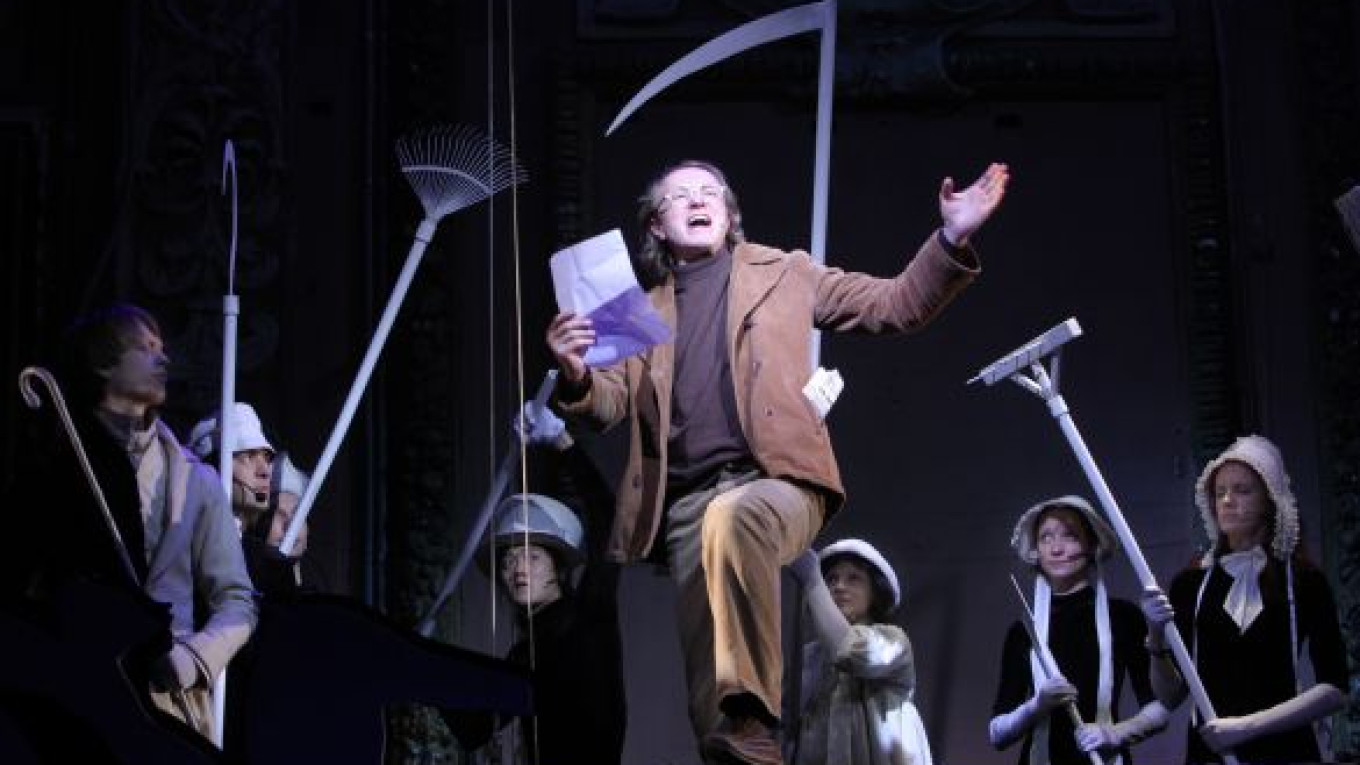Alexander Griboyedov’s “Woe From Wit” has attracted the attention of several Russian theaters over the last few seasons. A production by the Volkov Theater in Yaroslavl was one of the shows nominated for the recent Golden Mask Festival, and two major Moscow theaters — the Sovremennik and the Taganka — have staged the play in recent times.
You can now add the Contemporary Play School to that list.
Director Iosif Raikhelgauz lets us know right from the get-go that this is no routine interpretation of the classic 19th-century comedy about a young intellectual returning to Moscow and finding he is horrified by the lives his old friends live. Raikhelgauz calls his show “Russian Woe” and gives it a subtitle of “Playing With the Comedy ‘Woe From Wit.’”
On top of that, the show is attributed to three authors — Griboyedov, Vadim Zhuk and Sergei Nikitin. What that means is that this show is chock-full of songs with words by Zhuk and music by Nikitin. To make room for the twanging and crooning, Raikhelgauz cut Griboyedov’s text severely and reduced the original cast of 18 characters to five.
For the most part these changes turned a witty and biting play into a soft piece of entertainment.
Nikitin’s sentimental and melodic style is immediately recognizable to anyone who knows the popular Soviet films of the 1970s and 1980s. He provided the music for several box office hits, include “The Irony of Fate,” the Oscar-winning “Moscow Does Not Believe in Tears,” “Old New Year” and many others.
His compositions make “Russian Woe” sound very much like a production that has been around for 30 or 40 years.
Zhuk tosses in a few politically-tinged lyrics, especially in the final number of Act 1, in which a couplet about the abundance of cigarette smoke in Moscow leads into another about a conflagration seizing the city in flames. Put to the adapted tune of the Russian national anthem, it provides the biggest musical punch of the evening.
But primarily the songs are tame and cute, dutifully serving the transformation of this caustic play into a tale about lonely hearts and bungled love.
Perhaps the most effective part of the production is its first five minutes.
A piece of white paper begins falling lazily in the matte black box of the stage, but we soon realize that something is not quite right. The paper keeps falling and falling and falling, but never reaches the ground.
Suddenly, a crowd of individuals appears out of the darkness as if by magic to speak various famous lines from Griboyedov’s play. Dressed in costumes that are white in front and black in back, they blend in with the black background entirely until they turn to face the audience.
In fact, design elements and actors alike seem to come and go instantaneously as costumes and props alike are outfitted with black and white sides that allow them to go visible or invisible with a single twist or turn.
Designer Alexei Tregubov created an environment that resembles a children’s playroom. White cutouts of doors, windows and animals dangle suspended in the air until they magically disappear. ?
The magical qualities of this production can be effective and surprising. At least they are for awhile. Soon enough, however, they not only become routine, they become predictable, which is never a welcome quality in theater.
In fact, after we grow used to the fact that people are running around on stage hidden by their black costumes, we start seeing what we are not meant to see. The eye cannot be fooled forever by the same trick.
Not surprisingly, the actors’ performances are largely lost amid the tricks and the constant interruptions of the songs.
As Chatsky, the young man returning from travels abroad, Alexei Gnilitsky plays an earnest but anonymous figure. One is rather inclined to understand why Sofia (Yekaterina Direktorenko) dumped him in his absence. True, Molchalin (Stepan Rozhkov), the man she chose to replace Chatsky, may be a two-timing schemer, but at least he appears to keep her warm at night.
Most intriguing of all is Tatyana Tsirenina’s Liza, Sofia’s spunky servant who has no qualms whatsoever about playing off Molchanin’s interest in her against that of Sofia’s father Famusov (Ivan Mamonov).
“Russian Woe” is neither musical, concert, magic show nor dramatic performance. It has bits and pieces of all of those genres, but all of them still add up to less than a production of significance.
“Russian Woe” (Russkoye Gore) plays May 27 and June 6 at 7 p.m. at the Contemporary Play School, located at 29/14 Neglinnaya Ulitsa. Tel. 694-0756, 694-3087, www.neglinka29.ru. Running time: 2 hours.
A Message from The Moscow Times:
Dear readers,
We are facing unprecedented challenges. Russia's Prosecutor General's Office has designated The Moscow Times as an "undesirable" organization, criminalizing our work and putting our staff at risk of prosecution. This follows our earlier unjust labeling as a "foreign agent."
These actions are direct attempts to silence independent journalism in Russia. The authorities claim our work "discredits the decisions of the Russian leadership." We see things differently: we strive to provide accurate, unbiased reporting on Russia.
We, the journalists of The Moscow Times, refuse to be silenced. But to continue our work, we need your help.
Your support, no matter how small, makes a world of difference. If you can, please support us monthly starting from just $2. It's quick to set up, and every contribution makes a significant impact.
By supporting The Moscow Times, you're defending open, independent journalism in the face of repression. Thank you for standing with us.
Remind me later.


